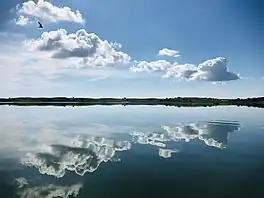| Prairie Lake | |
|---|---|
 Prairie Lake, 2020 | |
 Prairie Lake | |
| Location | Stutsman County, North Dakota |
| Coordinates | 47°09′33″N 99°06′50″W / 47.15909°N 99.11388°W |
| Type | Lake |
| Basin countries | United States |
| Managing agency | North Dakota Department of Trust Lands |
| Surface elevation | 565 m (1,854 ft) |
Prairie Lake is a terminal wetland lake found in Stutsman County, North Dakota. It is on land that is administered by the North Dakota Department of Trust Lands.[1]
Characteristics
The lake sits at an elevation of 565 meters. It has a watershed area of 4.5 km2. The substrate of the lake is mostly sandy, with areas of rock cobble and pebbles.[1]
The lake seasonally experiences low-water levels.[2] It has a relatively low water clarity.[3]
Ecology
The banks of the lake are peaty, and sedges are common. Plants such as Poa pratensis, Elaeagnus commutata, and Crataegus chrysocarpa are found ubiquitously around the lake.[1]
Data collection
The lake is home to two meteorological stations, one of which is situated on a buoy. Biological surveying is performed through electrofishing and sampling for zooplankton and macroinvertebrates.[1]
References
- 1 2 3 4 "Prairie Lake NEON". www.neonscience.org. National Ecological Observatory Network. Retrieved 7 January 2024.
- ↑ Parker, Stephanie M.; Utz, Ryan M. (September 2022). "Temporal design for aquatic organismal sampling across the National Ecological Observatory Network". Methods in Ecology and Evolution. 13 (9): 1834–1848. doi:10.1111/2041-210X.13944.
- ↑ Thomas, R Quinn; McClure, Ryan P; Moore, Tadhg N; Woelmer, Whitney M; Boettiger, Carl; Figueiredo, Renato J; Hensley, Robert T; Carey, Cayelan C (June 2023). "Near‐term forecasts of NEON lakes reveal gradients of environmental predictability across the US". Frontiers in Ecology and the Environment. 21 (5): 220–226. doi:10.1002/fee.2623.
Further reading
- Butler, Zachariah; Good, Stephen; Haagsma, Marja; Segura, Catalina; Hu, Huancui (November 2023). "Relationship between isotope ratios in precipitation and stream water across watersheds of the National Ecological Observation Network". Hydrological Processes. 37 (11). doi:10.1002/hyp.15018.